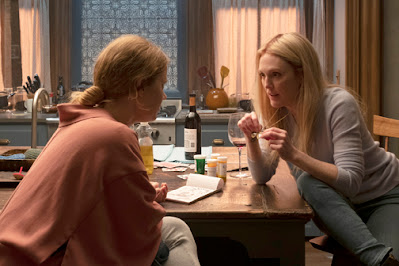I haven’t had this much fun with Charles Dickens, since 1982’s miniseries adaptation of The Life and Adventures of Nicholas Nickleby.
Mind you, “fun” isn’t easy to pull off, when it comes to Dickens. He does love to make his protagonists suffer.
Even so, director/co-scripter Armando Iannucci’s Personal History of David Copperfield — available via HBO Max — is a high-spirited romp: enlivened by marvelous performances, a cheeky interpretation of Dickens’ semi-autobiographical novel — co-scripted with Simon Blackwell — breathless pacing, and occasionally dazzling bursts of Terry Gilliam-style special effects.
The mere fact that this film cleverly covers so much of Dickens’ dense novel — 877 pages (!), in the Oxford edition — is astonishing all by itself. Granted, this cinematic experience is akin to a 119-minute sprint, but it’s hard to complain when the result is so entertaining.
David Copperfield boasts two of Dickens’ best-known supporting characters: the melodramatic, nobly flustered and penniless Wilkins Micawber, steadfastly retaining his dignity while forever one short step ahead of legions of debt collectors (and based on Dickens’ father); and the smarmy, sneakily loathsome Uriah Heep, one of the most creepily detestable villains ever concocted. They’re brought to glorious life by, respectively, Peter Capaldi and Ben Whishaw.
Acknowledging the joy and phenomenal success that Dickens experienced giving public performances of his works — less staid readings, and more acting tours de force (one of the author’s friends noted that “Dickens was like an entire theater company … under one hat”) — Iannucci opens his film as the adult David Copperfield (Dev Patel) stands on the stage of a theater crowded with fans, holding a stack of pages, and intones one of Dickens’ most famous introductions:
“Whether I shall turn out to be the hero of my own life, or whether that station will be held by anybody else, these pages must show.”
Young David (Ranveer Jaiswal, cute as a button) spends his happy early years without a father, raised more by a doting housekeeper, Clara Peggotty (Daisy May Cooper), than his loving but waiflike mother (Morfydd Clark), who mourns the loss of her husband. Alas, when David is 7, she re-marries the cruel and abusive Edward Murdstone (Darren Boyd, suitably imperious), who beats the boy for falling behind in his studies.
Murdstone is accompanied by his equally nasty spinster sister, Jane (the imposing Gwendoline Christie, well remembered as Brienne of Tarth, in HBO’s Game of Thrones).








